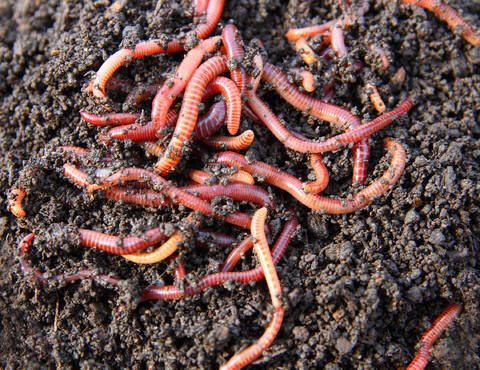Composting-ready red wigglers: Enrich your garden naturally
Composting-ready red wigglers: Enrich your garden naturally
Blog Article
The Ultimate Guide to Red Wigglers for Healthy And Balanced Soil
The role of red wigglers, scientifically understood as Eisenia fetida, in soil health and wellness is a topic of enhancing interest among sustainable horticulture lovers and agricultural professionals alike. These organisms not just recycle natural waste however likewise improve dirt fertility via their nutrient-rich spreadings.
What Are Red Wigglers?
Red wigglers, scientifically understood as Eisenia fetida, play a vital role in composting and dirt wellness. These earthworms are especially fit for vermicomposting, a process that uses their natural habits to disintegrate natural issue effectively. Unlike various other earthworm types, red wigglers thrive in rich natural settings, making them optimal for garden compost bins and worm ranches.
Gauging regarding 3 to 4 inches in size, red wigglers have a distinct reddish-brown coloration and a segmented body that assists in their movement with decomposing products. They are detritivores, meaning they feed on decaying organic substances, consisting of cooking area scraps, plant debris, and paper items. red worms. Through their usage of these products, they help damage down intricate substances, turning them right into nutrient-rich spreadings that boost soil quality
Red wigglers are likewise prolific dog breeders, with the ability of replicating promptly under ideal conditions. Their versatility to different atmospheres permits them to prosper in a variety of composting systems. By comprehending the biology and eco-friendly importance of red wigglers, garden enthusiasts and farmers can harness their capacities to enhance dirt health and wellness and promote lasting methods in farming.

Advantages of Red Wigglers
The many advantages of incorporating red wigglers into composting practices considerably improve dirt health and fertility. These earthworms, medically referred to as Eisenia fetida, excel at breaking down natural issue, transforming kitchen scraps and backyard waste into nutrient-rich vermicompost. This process not just speeds up decay yet additionally improves the soil with crucial nutrients such as nitrogen, phosphorus, and potassium.
Furthermore, red wigglers improve soil structure by creating aggregates that facilitate oygenation and water retention. Their burrowing activities advertise a well-aerated setting, enabling origins to access oxygen more efficiently. This boosted aeration likewise promotes helpful microbial activity, which is crucial for nutrient biking and total dirt vitality.
In enhancement to improving soil composition and structure, red wigglers add to pest monitoring. Their visibility in the soil helps reduce unsafe nematodes and other pests, decreasing the requirement for chemical treatments. The application of vermicompost leads to boosted plant strength against conditions, advertising healthier growth.
Establishing Up a Worm Container
Setting up a worm container can be a satisfying endeavor for those seeking to enhance their composting efforts. The very first step is picking an appropriate container, ideally made from plastic or timber, with a capability of a minimum of 10 gallons to accommodate the worms and their food. Make sure the container has adequate ventilation-- pierce small openings in the cover and sides to advertise air movement while stopping excess moisture accumulation.

Present the red wigglers right into the bin, enabling them to accommodate to their brand-new setting. Ideally, start with a population of about one extra pound of worms per square foot of area. Put the worm container in an area that maintains a stable temperature, ideally between 55 ° F and 77 ° F. With these fundamental actions, your worm container will certainly be all set to thrive in the quest of healthy and balanced dirt.
(red wigglers)
Feeding Your Red Wigglers
When it comes to supporting red wigglers, understanding their nutritional needs is vital for preserving a healthy and balanced worm container. These worms thrive on a diverse diet regimen, mostly composed of raw material. Suitable food resources include vegetables and fruit scraps, coffee grounds, crushed eggshells, and shredded paper or cardboard. Nonetheless, it is critical to stay clear of feeding them citrus fruits, onions, and garlic, as these can be damaging to their health.
Section control is important; overfeeding can result in smell problems and draw in pests. A good guideline is to supply food that is roughly equivalent to the weight of the worms in the bin weekly. Monitor the consumption price and adjust feeding quantities appropriately.
To advertise a balanced diet, goal to give a mix of nitrogen-rich greens, such as veggie peels, and carbon-rich browns, such as dried fallen leaves or cardboard. Furthermore, preserving appropriate wetness levels is essential-- food scraps ought to perspire but not soggy - red worms. By thoroughly handling their diet regimen and setting, you will guarantee that your red wigglers continue to be healthy and efficient, adding effectively to the composting process
Utilizing Worm Spreadings in Dirt
Integrating worm spreadings right into soil can dramatically enhance its health and fertility. Worm castings, also referred to as vermicompost, are a rich resource of nutrients, consisting of nitrogen, phosphorus, and potassium, essential for plant growth. When added to soil, these castings improve its structure by increasing aeration and improving dampness retention, which is specifically useful in deserts.
Additionally, worm spreadings present advantageous bacteria that advertise a healthy and balanced dirt ecosystem (red worms). These bacteria help in damaging down raw material, making nutrients quicker offered to plants. The existence of these microorganisms likewise assists subdue soil-borne conditions, lowering the need for chemical plant foods and pesticides
To utilize worm spreadings efficiently, blend them into the top couple of inches of soil before planting or apply them as a top dressing around developed plants. A recommended application price is concerning 10-20% castings combined with dirt to maximize nutrient accessibility without frustrating the plants.
Final Thought
In final thought, red wigglers, or Eisenia fetida, play an essential role in boosting soil wellness via their vermicomposting activities. Eventually, the integration of red wigglers right into dirt management why not try here strategies promotes sustainable farming by reducing dependence on chemical plant foods and fostering beneficial microbial task.
Report this page